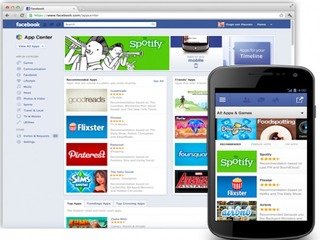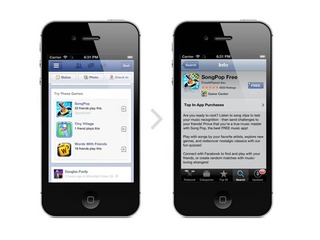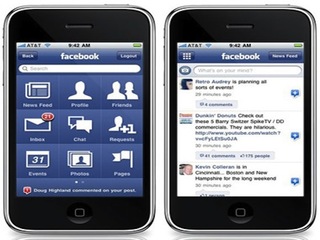
Mark Zuckerberg says Facebook is now a mobile company
Zuckerberg promises updates to mobile app, with features not included on last release

Giving his first interview since the IPO, Facebook CEO Mark Zuckerberg answered questions at the TC Disrupt conference in San Francisco Tuesday, in which he talked extensively about his company’s mobile integration.
Calling the performance of Facebook’s stock since its IPO “disappointing,” Zuckerberg said that in the next three to five years, the performance of the company will depend on how well it does on mobile, and he seemed pretty confident that Facebook would do well in that area.
“I think its easy for a lot of folks, without us being out there talking about the stuff we’re doing, to really underestimate how good, how fundamentally good, mobile is for us," he said.
Part of the reason he sounds so optimistic is that there are more people who have phones than have computers, he said. 5 billion people have phones, with smartphones and Facebook users growing quickly.
Zuckerberg says that people who use Facebook on mobile are more engaged; they spending more time on the app, are more likely to be daily active users, and are twice as likely to use Facebook 6 out 7 days of the week. And those stats are from before recent iOS update. And, because of the higher level of engagement, he thinks Facebook is going to make a lot more money.
In terms of advertising, Zuckerberg said, mobile is a lot closer to television than desktop is, just in terms of how the ads must be integrated.
On desktops, Facebook has the ads that appear on the right hand column. "It’s been great," he said. "We built a multi-billion dollar business by doing that.”
On mobile, though, Facebook can’t structure its ads the same way, simply because there isn’t room on the screen, so the ads have to be more integrated. And these ads are already performing better than the right hand column ads.
Zuckerberg does admit that the company made mistakes when it came to mobile, though, and he expressed his biggest regret.
“I think that the biggest mistake that we made as a company is betting too much on HTML5, as opposed to native.”
More people using mobile web Facebook than iOS and Android apps combined, Zuckerberg said, “so mobile web is a big thing for us" but called the two years the company tried creating FaceWeb, which was the HTML5 version of Facebook for mobile, a waste of time.
“We burnt two years. It’s really painful. I think probably we will look back on it, saying that that is one of the biggest mistakes, if not the biggest strategic mistake, that we’ve made, but we’re coming out of that now, right, and we have the iOS app is in good shape and the Android one will hopefully be soon.”
Zuckerberg still expressed some disappointment in the iOS, despite all of the recent updates, saying that the company decided that it wanted to get the rewrite done as quickly as it could, despite having a bunch of features it wanted to add. To simplify it, Facebook decided to get the new version out there with the same features as before, just faster. But now that the company did that, it can finally get around to giving people the good stuff.
“One of the things I’m really excited about is that, in parallel, our teams have been building other features and apps that we just didn’t launch with the last release, because we wanted the first release to be this clean thing, with exactly the same feature set, just really fast now. Over the coming weeks and months I think we can expect to see a lot of the cool stuff that people have been working on over the past half year, year, coming out in these apps as well.”
Zuckerberg also said a new version of the Android app is currently being developed, though he could not give a timeframe.
Facebook has recently retooled how the company makes products. Around the end of last year, the company started putting a single person in charge of every product.
It went from having a mobile core team, which was producing 90% of mobile code, to 90% coming from all the teams. And only 10%, product infrastructure, being built by mobile core team.
“We’ve transitioned, and we are a mobile company. All the code that is being written is mobile.”
Related News


Facebook and Zynga's thumbs in the mobile dike

Facebook App Center makes its global debut


